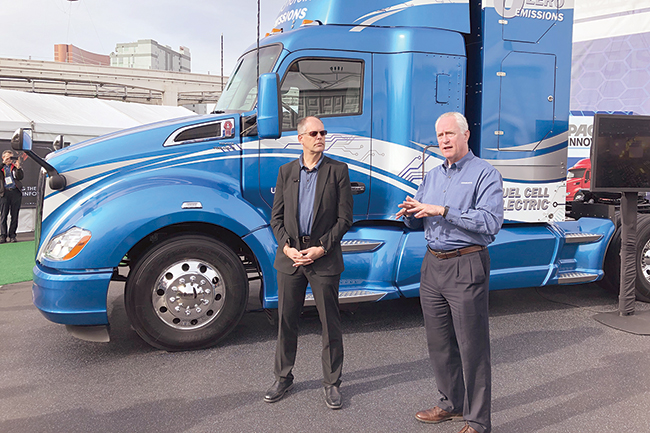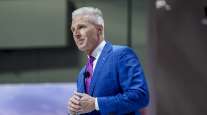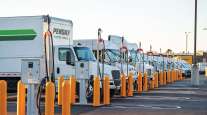Managing Editor, Features and Multimedia
Kenworth, Toyota Partner to Develop 10 Hydrogen-Electric Trucks

LAS VEGAS — Kenworth Truck Co. and Toyota are collaborating to develop 10 hydrogen-electric tractors for drayage operations in the Los Angeles basin, the companies announced.
The zero-emissions trucks will be based on Kenworth’s T680 model and will utilize Toyota’s hydrogen fuel cell technology.
The project is part of a $41 million grant preliminarily awarded by the California Air Resources Board.
Kenworth and Toyota made the announcement Jan. 8 here at CES, where they showcased a hydrogen-electric T680 branded with both companies’ names to signify their partnership moving forward.

More From CES 2019
In recent years, Kenworth and Toyota independently produced hydrogen fuel cell truck prototypes. Toyota built two trucks from Kenworth glider kits through its Project Portal fuel cell truck program, while Kenworth showed a truck using hydrogen fuel cell technology from another supplier.
But now the companies will be combining their efforts.
“We’re taking some things that we learned with the Kenworth truck, a lot of things that Toyota has learned with their trucks, and we’re working together to build the next-gen trucks,” said Brian Lindgren, director of research and development at Kenworth.
The 10 hydrogen-electric trucks co-developed by Kenworth and Toyota will have a range 300 miles in typical drayage operations, according to the companies.
The vehicles will haul cargo in the Los Angeles basin and to inland California cities such as Ontario and San Bernardino.

Kenworth’s Lindgren (right) and Toyota’s Lund discuss the companies’ collaboration on hydrogen-electric trucks during CES. (Seth Clevenger/Transport Topics)
In addition to the 10 trucks, the project will fund the development of hydrogen fueling infrastructure, including plans for two new fueling stations to be built by Shell Oil Products.
Rather than relying on heavy battery packs, hydrogen-electric trucks store energy as hydrogen and convert it into electricity to power the electric motor.
“We believe that carrying energy in the form of hydrogen makes more sense for Class 8 heavy-duty tractors than carrying it in batteries,” Lindgren said, citing the lower weight and shorter refueling time of a hydrogen-electric system compared with a pure battery-electric truck.
Andrew Lund, chief engineer for Toyota’s Project Portal, emphasized the environmental benefits that zero-emissions trucks could bring not only to Southern California, but the rest of North America as well.
Just arrived at #CES in Las Vegas and the trucks are already front and center. @PeterbiltMotors @KenworthTruckCo pic.twitter.com/kUjPQTyl87 — Seth Clevenger (@SethClevenger) January 8, 2019
“We want to challenge what’s impossible and make it possible,” he said. “A few years ago, maybe people would have said, ‘Really, a hydrogen fuel cell Class 8 truck?’ But both Kenworth and Toyota did it independently, and now we’re working to do it together.”
Startup Nikola Motor Co. also has developed electric trucks that incorporate fuel cells to extend the range of the vehicles.
Before applying its fuel cell technology to heavy-duty trucks, Toyota first introduced it in the passenger car market through its Mirai fuel cell sedan.
Toyota’s initial Project Portal test truck, dubbed “Alpha,” began operating in 2017 and has logged more than 10,000 miles in and around the ports of Los Angeles and Long Beach.
Russ Koble, public relations manager for advanced technology at Toyota, said the 10 trucks that Kenworth and Toyota plan to build already have been allocated to fleets.
Toyota’s logistics services fleet, which transports cars and parts around the Los Angeles basin, will be the largest operator with six of the trucks, he said. UPS Inc. will operate two of the others, and the remaining vehicles will be used by smaller companies, Koble added.




